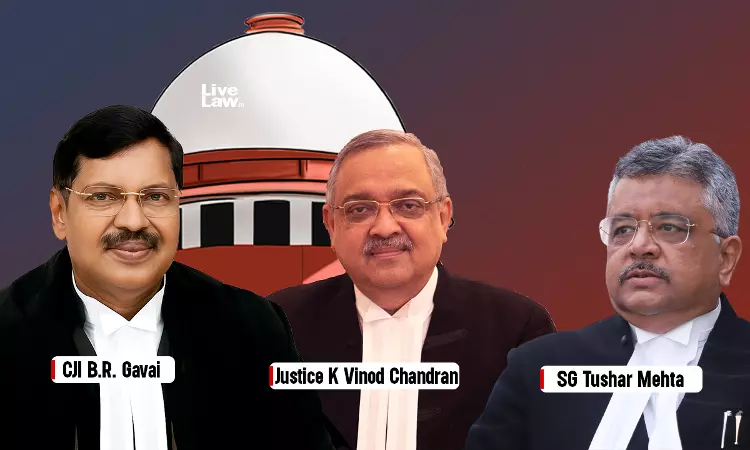- Home
- /
- Top Stories
- /
- 'You Cannot Say Media Narratives...
'You Cannot Say Media Narratives Influence Our Judgments' : Supreme Court To Solicitor General
Anmol Kaur Bawa
21 July 2025 7:13 PM IST
The Supreme Court today stated that its judgments and actions are not influenced by any "media narrative." The Court's statement came in response to a submission made by the Solicitor General that there was a media narrative being made against the Enforcement Directorate.A bench comprising Chief Justice of India BR Gavai and Justice K Vinod Chandran was hearing the Suo Motu case taken to...
The Supreme Court today stated that its judgments and actions are not influenced by any "media narrative." The Court's statement came in response to a submission made by the Solicitor General that there was a media narrative being made against the Enforcement Directorate.
A bench comprising Chief Justice of India BR Gavai and Justice K Vinod Chandran was hearing the Suo Motu case taken to address the issue of investigating agencies like the ED summoning advocates over the legal opinion given by them to their clients.
When the hearing started, CJI Gavai said that he was shocked after reading the reports in LiveLaw and Bar & Bench about the ED's summons to Senior Advocates.
SG Tushar Mehta clarified at the outset that the Union does not want to take an 'adversarial' stand in the suo motu case. At the same time, the SG stated that a wrong narrative is being built by the media against the ED. He urged the Court not to be influenced by such apparent narratives.
"I am saying this, not the ED, there is a concentrated effort to create a narrative against an institution. My lords may find in a few cases where there is overstepping, My lords will obviously-"
The CJI interjected him, "We are finding this in many cases, it's not like we are not finding (overstepping)"
SG reverted, "Please do not... based on interviews and YouTube- there is narrative building going on."
Disagreeing with the same, the CJI said that the Court's actions came from its experience of handling the cases before it.
While both the CJI and the SG were on the same page that observations of a bench are based on the facts of each case, the CJI highlighted how the ED has been filing appeals even against well-reasoned orders only for the sake of filing them.
"The ED, even after well-reasoned orders are passed, is filing appeal after appeal only for the sake of filing them," CJI said.
The SG countered that even before a matter is reached in the Courts, "the narrative building starts" through interviews and YouTube. He suggested that the Court also consider the issue of whether a lawyer can build a narrative outside the court while representing a client.
The bench expressly clarified that it was not basing its observations on the basis of any news or YouTube Interviews, which SG was pointing at.
Justice Chandran also objected to SG's contention and expressed: "How do you say that these narratives will influence us if we do not see them at all? Narratives will go on all over, people might be concerned, but you cannot say that we have been influenced by it."
CJI added, "Have you seen any of the judgments authored by us in which the decision is not based on the facts of the case? Name one judgment."
CJI also said that judges rarely get time to watch YouTube interviews. SG replied that there were media other than YouTube channels which attempt at narrative building.
The suo motu case was taken after a bench comprising Justice KV Viswanathan and Justice NK Singh had expressed concerns over the trend of police and investigative agencies summoning advocates, and had referred the matter to the Chief Justice of India. This development happened in a case where the Gujarat Police summoned an advocate who represented an accused. Staying the notice issued to the lawyer, the bench observed that summoning advocates will undermine the independence of the legal profession and consequently impact the fair administration of justice. Following the intervention by Justice Viswanathan's bench, the suo motu case was registered on July 4.
Case : In Re : Summoning Advocates Who Give Legal Opinion or Represent Parties During Investigation of Cases and Related Issues | SMW(Cal) 2/2025



